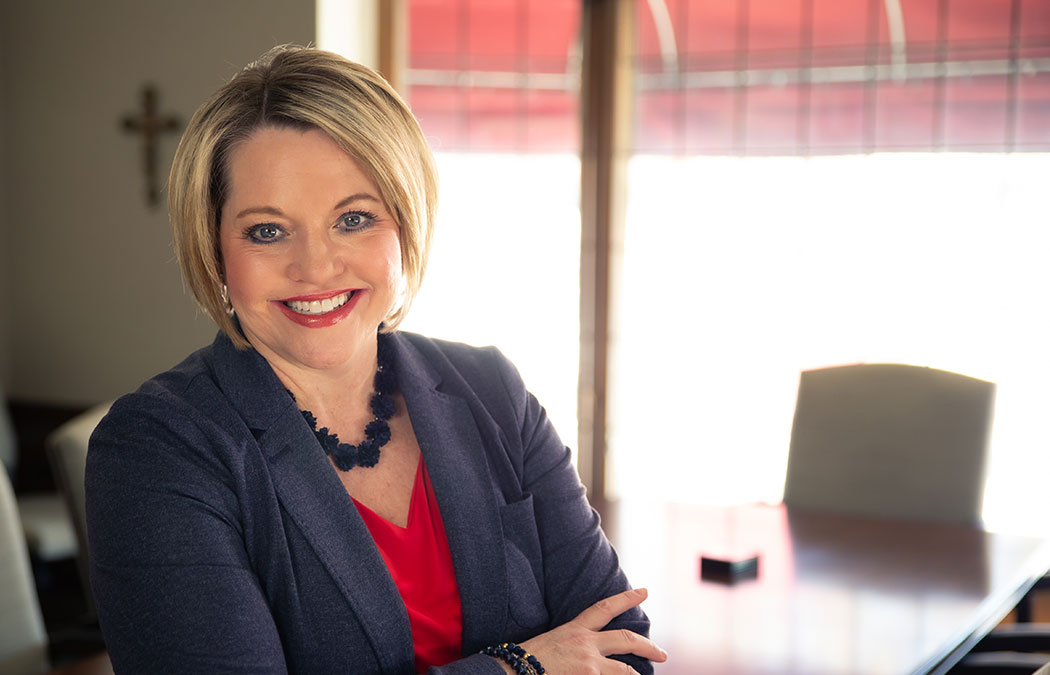When Michelle Wieser, Ph.D., became dean of the School of Business and Technology at Saint Mary’s in 2019, she brought with her a vision for opening new pathways to degree completion for a new generation of students. Many of these innovations are designed to appeal to underrepresented groups in business and technology, including women.
Statistics show that women in the United States have made slow progress toward gender parity in the workplace. According to McKinsey & Company’s 2020 Women in the Workplace report, between January 2015 and January 2020, the percentage of women in senior vice president positions increased from 23 to 28 percent, and women in executive-level positions increased from 17 to 21 percent. On average, Minnesota women were more successful. The 2019 Minnesota Census of Women in Corporate Leadership showed that women held nearly 23 percent of executive-level positions in the 76 largest publicly traded companies headquartered in Minnesota.
These findings and the fact that the pay gap between men and women also had been gradually narrowing is good news. This is pre-pandemic though. McKinsey & Company predicts “the progress we’ve seen over the past six years could be erased.” On Nov. 6, 2020, the Washington Post reported that the percentage of women in the U.S. labor force was equivalent to what it was in 1988.
The pandemic has a two-pronged effect on working women: Many of the eliminated jobs are low-paying service sector ones traditionally held by women, particularly women of color. Another issue is a lack of childcare and online school, forcing working mothers to juggle even more responsibilities than they usually do. Many have chosen to stay home. In September 2020 alone, 865,000 women dropped out of the workforce.
Involving men in gender diversity matters
Dean Wieser and others are addressing these matters by engaging men. In January 2020 Wieser joined the pilot group for Menttium’s new program, Women Mentoring Men: Standing Together for Change. Menttium is a woman-owned business specializing in mentoring programs. Women Mentoring Men activates men as advocates for gender parity. An expert in gender equality in the workplace, Wieser jumped at the opportunity to get involved.
The pilot group of 10 included senior leaders with the power to create change within their companies. Mentors and mentees met one-on-one and in group sessions with structured discussion topics and deliverables.
Wieser’s mentee was Rob Grubka, president, employee benefits, at Voya Financial. He was searching for insight into gender imbalances on one of Voya’s teams, which includes sales reps, most of whom are men, and client service employees, most of whom are women. Most women weren’t interested in the hours or travel that was typical on the sales side, raising questions for Grubka, such as “How do we change the job to make it more inclusive? What does the job really need to be?”
Allies and advocates
Naturally, participants discussed how women are being affected by the pandemic. Mothers often carry more of the parenting load. They have more difficulty juggling the demands of work and parenting children who are no longer in school or daycare.
The already negative impact on the careers of mothers has disproportionately affected Black women, and women who are senior leaders. McKinsey & Company reports that women are worried about being negatively judged because of their caregiving responsibilities, and they are uncomfortable sharing their challenges with colleagues. This makes conversations like the ones that took place between mentors and mentees more important than ever.
From conversation to change
Menttium designed the program to have depth and to produce change, but the outcome was better than anyone expected. Wieser’s mentee Grubka reports that he has material to share with Voya’s leadership team and that he is prepared to elevate the conversation on how to deliberately create an environment that values diversity.
The mentors reported that they got a lot out of the program too. “Because of the level of individual and group interaction in this program, we couldn’t run from tough conversations,” Wieser said. “That made all the difference for me. I have always been deeply passionate about gender equality in the workplace, but this program helped me view all of this through a race and ethnicity lens, too.”
Wieser will use what she has gained from the program in her next research project. Her Ph.D. dissertation was a major study on the impact of an MBA on women’s careers, conducted for Forté, a nonprofit dedicated to women’s career development. Comparing both extrinsic and intrinsic factors, Wieser found that men outpaced women in most factors, particularly in extrinsic areas. Her next study will consider how race and gender affect the experience of MBA students, from the application process through career success after graduation.
If workplaces are to achieve gender parity, it is important for men to be involved. In order to do that, we need safe spaces for courageous conversations about bias and privilege. When women mentor men, men have the opportunity to gain a different perspective and build skills for advocacy and allyship. If there was ever a time when women and men need to work together for change, it’s now.
To learn more, visit menttium.com/services/women-mentoring-men.
Find the results of Wieser’s dissertation research by searching for “Women, Men, and the MBA: A Quantitative Assessment of the Impact of the MBA Degree on the Extrinsic and Intrinsic Career Outcomes of Graduates.”
